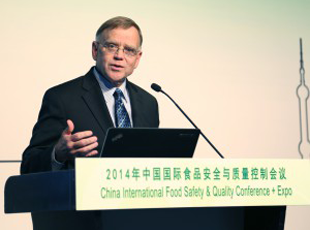Partnerships Are the Key to Keeping Foods Safe Worldwide
Michael R. Taylor spoke at the China International Food Safety and Quality Conference and Expo in Shanghai about meeting the food safety challenges that all nations face.
 The success or failure of our efforts to keep foods safe all over the world rests on the strength of our global partnerships and the work we can do together to verify that food safety standards are being met. That’s why, today, after two days of meetings in Beijing with Chinese regulators, I am speaking at the China International Food Safety and Quality Conference and Expo in Shanghai about meeting the food safety challenges that all nations face.
The success or failure of our efforts to keep foods safe all over the world rests on the strength of our global partnerships and the work we can do together to verify that food safety standards are being met. That’s why, today, after two days of meetings in Beijing with Chinese regulators, I am speaking at the China International Food Safety and Quality Conference and Expo in Shanghai about meeting the food safety challenges that all nations face.
Deputy FDA Commissioner Michael R. Taylor giving the keynote address at the China International Food Safety and Quality Conference and Expo.
No matter where we live, we all want to feed our families with the confidence that the foods we are enjoying are safe to eat. Food safety is thus a goal that transcends international borders, and the food supply has never been so global. In the United States, 15 percent of our food supply is imported from other countries, including nearly 50 percent of fresh fruit and 20 percent of fresh vegetables. And last year, the U.S. exported a record $136 billion in foods, feed and beverages.
Congress recognized this when it enacted the FDA Food Safety Modernization Act (FSMA) and established a new regulatory paradigm for food safety, drawing on widely accepted international practices. The paradigm is simple. No matter where food comes from, we will achieve the best food safety results if we define—in workable, science-based standards—the approaches to managing food safety systems that we know are effective in preventing food safety problems AND if we achieve high rates of compliance with those standards.
Verification is key to the success of the FSMA paradigm and our global understanding of how to make food safe. It is also key to the consumer confidence that makes robust trade in food possible. Verification begins with what food producers do in their operations to verify, on an ongoing basis, that they are successfully implementing proper controls to prevent safety problems. But verification is also a public responsibility and a challenge that all nations face in our global food system.
From left, Christopher Hickey, director of FDA’s China offices, Deputy Commissioner Michael Taylor and Roberta Wagner, co-chair of FDA’s FSMA Operations Team Steering Committee, visiting the China Food and Drug Administration.
Domestically, we will use inspections and other means, including sampling and testing, to verify that private food safety management systems are working effectively to prevent problems. This is a shift from our historic focus on enforcement of adulteration standards, although we will continue to act swiftly and forcefully when violations are putting consumers at risk.
In FDA’s oversight of imported foods, FSMA’s new Foreign Supplier Verification Programs (FSVP) will make importers accountable to FDA for documenting that their foreign suppliers have taken preventive measures to help ensure the safety of their food products. And we will inspect importers to verify that they are doing their job with regard to FSVP.
But we know that is not enough. Congress also mandated that we work more closely with foreign governments to verify that food safety standards are being met, so we are investing heavily in new forms of partnership with major trading partners with the goal of relying on each other’s verification activities as an element of the overall assurance system.
A prime example and model for collaboration is our joint initiative with Mexico to build a full operational partnership on produce safety, based on a strongly shared commitment to food safety as a public health goal. We are working directly with SENASICA and COFEPRIS – the agencies in Mexico that are responsible for produce safety – to expand the sharing of information, personnel and best practices, and to improve laboratory and other technical harmonization. Our goal is mutual reliance on each other’s oversight work. This initiative includes an important public-private partnership component.
Another model for building verification partnerships is our pursuit of what we call “systems recognition agreements” with countries whose overall food safety systems are comparable to ours. We have one with New Zealand and are working on agreements with Canada and Australia.
We also believe that being present in foreign countries is important to our own verification work and to building partnerships with foreign governments. That’s why we have increased our foreign inspections and have FDA offices in China, India, Europe, and Latin America. China, with its size and complexity, poses unique challenges as we seek to build food safety partnerships, so we are working to increase our China-based staff as a way to improve verification and foster mutual understanding and confidence.
The challenge of implementing the FSMA food safety paradigm on a global scale is huge, but I’m convinced from all the dialogue we’ve had around the world that we are on the right track. We have a long way to go, of course, but I have no doubt we’ll get there with the continued collaboration and commitment of our trading partners.
Michael R. Taylor is FDA’s Deputy Commissioner for Foods and Veterinary Medicine
Source: blogs.fda.gov


